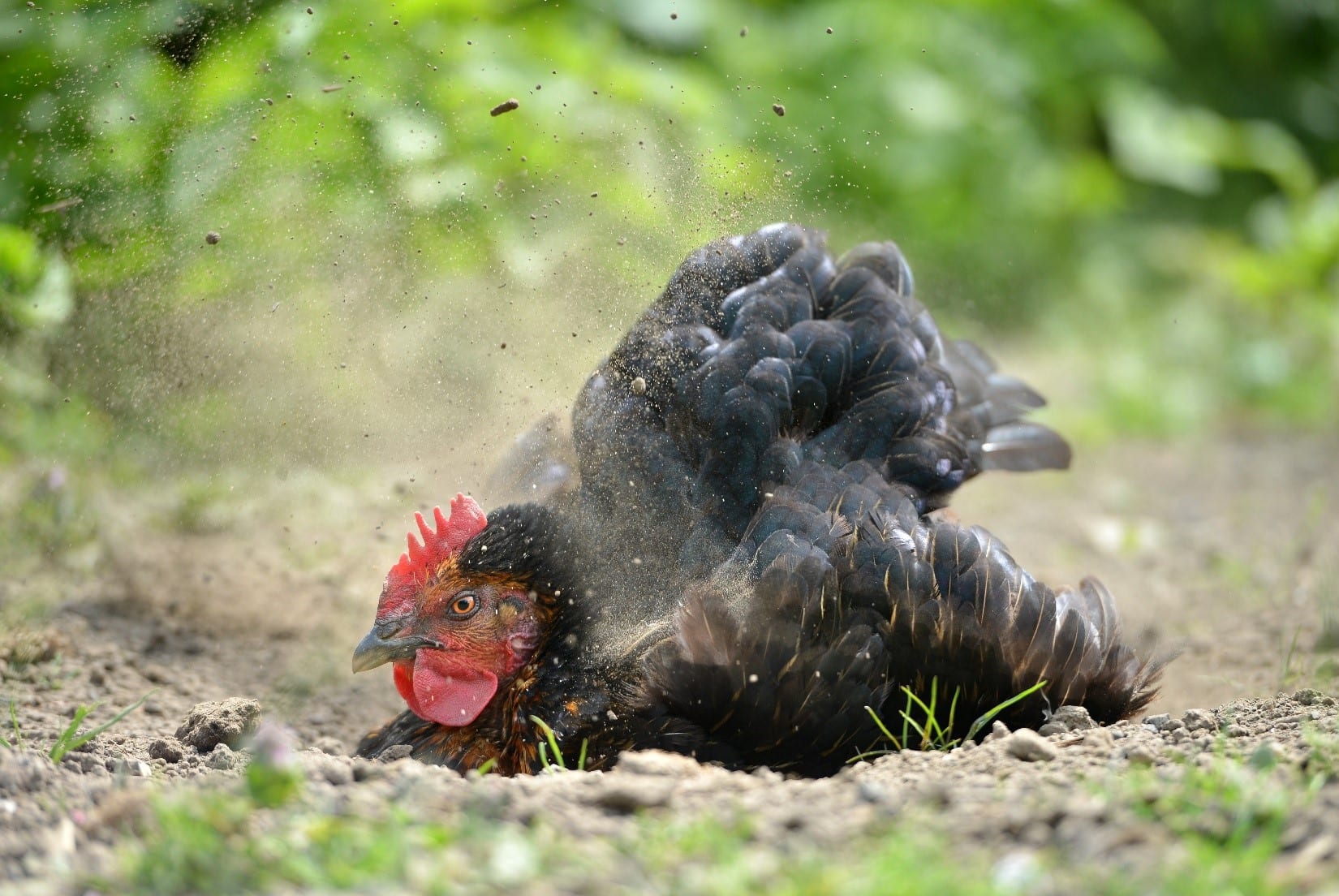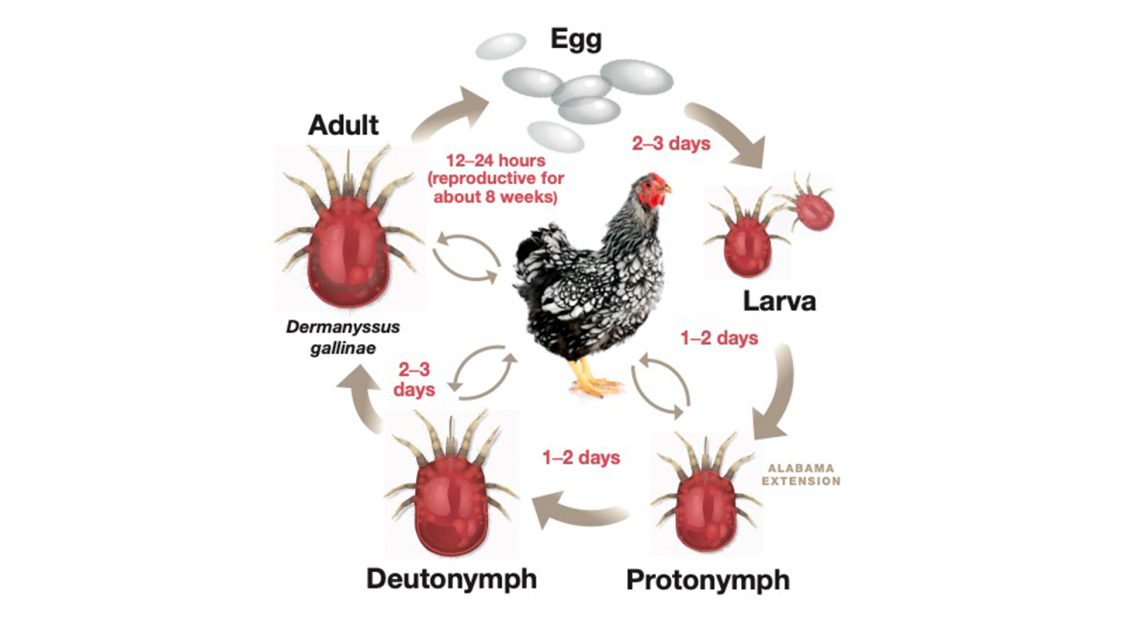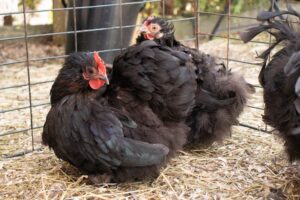Poultry mites can be a serious issue for bird owners. These tiny pests cause discomfort and health problems for chickens.
Poultry mites are small, but they create big problems. They feed on the blood of chickens, leading to itching, feather loss, and even anemia. If left untreated, mites can spread quickly through a flock, causing stress and lowering egg production.
This guide will help you understand how to treat poultry mites effectively. You will learn the signs to look for, and the best methods to get rid of these pests. Keeping your chickens healthy and happy is crucial, and treating mites is a key part of that. Let’s dive into how you can protect your birds from these pesky invaders.

Credit: www.freedomrangerhatchery.com
Identifying Poultry Mites
Identifying poultry mites is crucial for maintaining a healthy flock. These tiny pests can cause significant discomfort and health problems for your chickens. Early detection and treatment are essential. In this section, we will explore the common symptoms and types of poultry mites.
Common Symptoms
Poultry mites are hard to see due to their small size. Look for these symptoms in your chickens:
- Excessive preening or scratching
- Visible mites on the skin or feathers
- Pale combs and wattles
- Restlessness and decreased egg production
- Scabs or sores on the skin
These symptoms indicate a mite infestation. Immediate action is required to prevent further harm.
Types Of Mites
Several types of mites can infest poultry. Understanding each type helps in choosing the right treatment.
Red Mites
Red mites, also known as chicken mites, feed on blood at night. They hide in cracks during the day. These mites can cause anemia and even death in severe cases.
Northern Fowl Mites
Northern fowl mites stay on the bird day and night. They cause irritation and can lead to decreased egg production.
Scaly Leg Mites
Scaly leg mites burrow under the scales on a chicken’s legs and feet. This causes thickened, crusty skin. Left untreated, it can lead to lameness.
Recognizing the type of mite is important for effective treatment. Each type requires a different approach to eliminate the infestation.
Preventive Measures
Preventive measures play a key role in keeping poultry mites at bay. By maintaining a clean environment and practicing proper biosecurity, you can protect your poultry from these pests. These steps help ensure a healthy and productive flock.
Regular Cleaning
Regular cleaning of the coop is essential. Remove droppings and replace bedding weekly. Wash feeders and waterers daily. Disinfect the coop regularly to kill mites and their eggs. This practice reduces mite infestation risks.
Biosecurity Practices
Biosecurity practices are crucial in preventing mite infestations. Limit access to the coop to necessary personnel only. Provide clean clothing and footwear for anyone entering the coop. Ensure new birds are quarantined before joining the flock. Check for mites during this period.
Inspect your flock regularly for signs of mites. Early detection helps in managing and controlling infestations. Keep wild birds away from your coop, as they can carry mites. Use bird-proofing measures to secure the coop.
Natural Remedies
Dealing with poultry mites can be frustrating. Natural remedies offer safe options. These solutions are effective and gentle on your chickens. Let’s explore some of the best natural remedies.
Diatomaceous Earth
Diatomaceous Earth (DE) is a fine powder. It is made from fossilized algae. DE has sharp edges on a microscopic level. These edges cut through the exoskeleton of mites. This causes them to dehydrate and die. Sprinkle DE in the chicken coop. Focus on nesting boxes and perches. Make sure to use food-grade DE. Avoid inhaling the dust. Wear a mask during application.
Herbal Solutions
Herbs can help repel mites. Lavender, mint, and rosemary are effective. Place fresh herbs in nesting boxes and around the coop. You can also make an herbal spray. Boil water and steep the herbs. Strain the liquid and cool it. Spray this solution in the coop. Repeat this process weekly. This helps keep mites away naturally.

Credit: the-chicken-chick.com
Chemical Treatments
Treating poultry mites effectively often involves chemical treatments. These treatments include various insecticides designed to eliminate mites quickly. Knowing how to apply these chemicals safely and effectively is crucial. Below, we explore the types of insecticides and the necessary safety precautions.
Insecticides
Insecticides are chemicals that kill insects. They are effective against poultry mites. Common insecticides for poultry mites include permethrin, carbaryl, and spinosad. These insecticides can be sprayed directly onto the birds or their environment. Some insecticides come in powder form. The powder can be applied to the birds’ feathers and the coop.
| Insecticide | Form | Application |
|---|---|---|
| Permethrin | Spray, Powder | Birds, Coop |
| Carbaryl | Powder | Birds, Coop |
| Spinosad | Spray | Birds, Coop |
It is important to follow the manufacturer’s instructions. Misuse of insecticides can harm your birds. Regular application may be necessary to keep mites at bay.
Safety Precautions
Safety precautions are essential when using chemical treatments. Always wear protective clothing, such as gloves and masks. Keep the insecticides out of reach of children and pets. Ensure proper ventilation when applying insecticides in enclosed spaces. This prevents the buildup of toxic fumes.
- Wear protective clothing
- Keep chemicals away from children and pets
- Ensure proper ventilation
Always read the label before use. The label contains crucial information on safe use. Dispose of empty containers properly. Do not reuse them for other purposes.
Environmental Control
Poultry mites can cause significant problems for your flock. To effectively manage these pests, focusing on environmental control is essential. Proper maintenance and improving your coop’s environment can significantly reduce mite infestations.
Coop Maintenance
Regular coop maintenance is crucial in preventing mite infestations. Follow these steps to keep your coop clean:
- Remove all bedding and nesting materials weekly.
- Scrub the coop with a mixture of water and mild soap.
- Disinfect surfaces with a poultry-safe disinfectant.
- Allow the coop to dry completely before adding fresh bedding.
Inspect your coop for cracks and crevices. Mites hide in these areas. Seal any gaps with non-toxic caulk. This prevents mites from finding hiding spots.
Ventilation Improvement
Improving ventilation in your coop is another effective way to control mites. Good airflow reduces humidity levels. Mites thrive in humid environments. Follow these tips to enhance ventilation:
- Install windows or vents on opposite sides of the coop.
- Use mesh screens to keep pests out while allowing air to flow.
- Ensure vents are above roosting areas to prevent drafts.
- Consider using a small fan to boost airflow on hot days.
By improving ventilation, you create a less hospitable environment for mites. This can reduce their numbers and improve your flock’s health.
Diet And Nutrition
Proper diet and nutrition play a vital role in treating poultry mites. A well-balanced diet helps your birds develop a strong immune system. This, in turn, helps them fight off mite infestations. Below, we delve into key aspects of diet and nutrition.
Boosting Immunity
Boosting immunity is crucial for healthy poultry. A robust immune system helps birds resist mites naturally. Include foods rich in vitamins and minerals.
- Vitamin A: Essential for skin health. Found in carrots and leafy greens.
- Vitamin E: Supports immune function. Found in seeds and nuts.
- Vitamin D: Strengthens bones. Found in fish oil and sunlight.
Provide fresh, clean water daily. Hydration is key for overall health. Make sure the birds have access to clean water at all times.
Supplements
Supplements can enhance the diet of your poultry. They provide extra nutrients that might be missing from their regular feed.
| Supplement | Benefit | Source |
|---|---|---|
| Probiotics | Improve gut health | Yogurt, commercial probiotic mixes |
| Garlic | Natural insect repellent | Fresh garlic, garlic powder |
| Apple Cider Vinegar | Boosts immune system | Organic apple cider vinegar |
Introduce supplements gradually. Monitor the birds for any adverse reactions.
Consistent feeding practices can make a big difference. Feed your poultry at regular intervals. This helps maintain their health and strength.
Monitoring And Follow-up
Effective monitoring and follow-up are crucial steps in treating poultry mites. These practices ensure that your flock remains healthy and free from infestations. Regular inspections and meticulous record keeping play vital roles in this process. Below, we delve into these essential aspects.
Regular Inspections
Conducting regular inspections is the first line of defense against poultry mites. Check your birds and their environment at least once a week. Look for signs of mites like redness, feather loss, and excessive scratching. Pay close attention to areas like the vent, under the wings, and around the neck. Early detection can prevent a full-blown infestation.
Record Keeping
Maintaining detailed record keeping helps track the health of your flock. Create a log to document inspection dates, findings, and treatments. This log can include:
- Date of inspection
- Number of birds inspected
- Signs of mites observed
- Treatment applied
- Follow-up actions needed
A sample table for record keeping could look like this:
| Date | Birds Inspected | Signs of Mites | Treatment Applied | Follow-Up Actions |
|---|---|---|---|---|
| 01/10/2023 | 10 | Redness, Feather Loss | Diatomaceous Earth | Re-inspect in 7 days |
| 08/10/2023 | 10 | No Signs | None | Continue Weekly Checks |
This approach helps identify patterns and evaluate the effectiveness of treatments. Consistent monitoring and accurate records ensure you stay ahead of potential mite problems. Keep your birds healthy and thriving with these simple practices.
Professional Help
Dealing with poultry mites can be challenging. Sometimes, you need professional help. Vets and specialists have the knowledge and tools to handle severe infestations. Their expertise ensures the health and safety of your birds.
When To Consult A Vet
If your birds show signs of illness, consult a vet. Look for symptoms like feather loss, weight loss, or reduced egg production. These signs indicate a serious mite problem. Early intervention can save your flock. A vet can provide accurate diagnosis and treatment options.
Finding Specialists
Finding a specialist might seem daunting. Start by asking local farmers for recommendations. Check online directories and read reviews. Look for experts with experience in treating poultry mites. Contact your local agricultural extension office. They often have lists of trusted professionals.

Credit: grubblyfarms.com
Frequently Asked Questions
What Are Poultry Mites?
Poultry mites are small parasites that infest chickens. They feed on blood, causing discomfort and health issues.
How Can I Identify Poultry Mites?
Look for signs like itching, feather loss, and red spots. Check under wings and near the vent.
Are Poultry Mites Harmful To Chickens?
Yes, poultry mites can cause anemia, reduced egg production, and stress. Severe infestations can be fatal.
What Are Natural Treatments For Poultry Mites?
Use diatomaceous earth, garlic, and neem oil. Regular cleaning and dust baths can help control mites.
Conclusion
Treating poultry mites effectively is crucial for healthy birds. Regular cleaning helps prevent infestations. Use natural treatments like diatomaceous earth. Keep your coop dry and well-ventilated. This reduces mite problems. Check your birds frequently for signs of mites. Act quickly when you spot them.
Your birds will be healthier and happier. A little effort goes a long way in controlling mites. Happy birds mean better egg production. Stay vigilant and maintain a clean environment.




